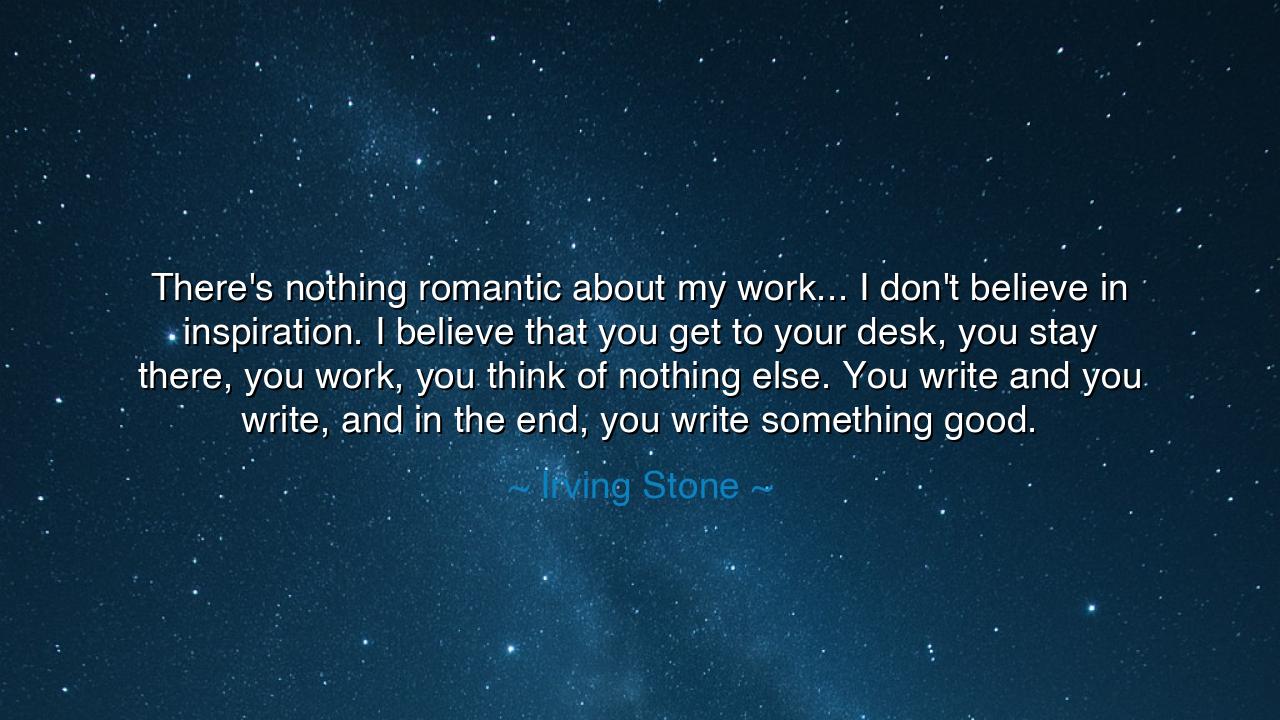
There's nothing romantic about my work... I don't believe in
There's nothing romantic about my work... I don't believe in inspiration. I believe that you get to your desk, you stay there, you work, you think of nothing else. You write and you write, and in the end, you write something good.






"There's nothing romantic about my work... I don't believe in inspiration. I believe that you get to your desk, you stay there, you work, you think of nothing else. You write and you write, and in the end, you write something good." These powerful words from Irving Stone strike at the heart of the creative process, demystifying the art of writing and calling out the myth of effortless inspiration. In an age where romanticized visions of artistic genius often overshadow the true demands of creative work, Stone offers a candid truth: true creativity is not about waiting for the muse to strike but about discipline, perseverance, and an unwavering commitment to the task at hand. The artistic process, as Stone describes it, is not an act of divine intervention, but of hard, steady work.
In the ancient world, the idea of the inspired artist was common. The Greeks spoke of the Muses, goddesses who bestowed creativity upon poets and artists. The notion of inspiration—that creative work is the result of a sudden, divine spark—pervaded the artistic landscape. Yet, even the greatest philosophers like Plato understood that true knowledge and wisdom were not simply gifts from the gods, but were cultivated through hard work, study, and dedication. Plato's Academy was founded on the idea that wisdom comes from reasoning and learning, not from a sudden flash of insight. Similarly, Stone’s words suggest that writing, like all forms of art, is the product of dedication and continuous effort.
Consider the example of Michelangelo, the master sculptor and painter whose work still stands as one of the pinnacles of artistic achievement. Michelangelo's David, a masterpiece carved from a single block of marble, did not spring from a divine moment of inspiration but from years of toil, dedication, and a mastery of his craft. Even as he worked on the Sistine Chapel, he faced challenges, frustrations, and long hours spent on his back painting the ceiling. His process was not glamorous but involved painstaking labor. The final result was a masterpiece, not because of a sudden burst of inspiration, but because of grit, focus, and the relentless pursuit of excellence. Much like Stone describes, Michelangelo knew that the only way to achieve greatness was to simply show up and do the work.
In Stone's own life, the writing of historical novels like "The Agony and the Ecstasy", which portrays the life of Michelangelo, required the same kind of dedication and discipline that he admired in the great artists. Stone often wrote for hours on end, with no expectation of immediate results or bursts of inspiration. He, too, was driven by the belief that writing is a craft that requires relentless practice, and only through that practice could something truly great emerge. It is not the muse that makes the artist, but the artist’s willingness to sit at their desk and work every day, putting in the time required to hone their craft. As Stone himself states, the result of this process is the creation of something good—not because of divine intervention, but because of the power of consistent effort.
This rejection of the myth of inspiration has broader implications beyond just writing. It speaks to the very nature of success in any field—whether in the arts, sciences, or personal endeavors. Thomas Edison, the great inventor, famously said, "Genius is one percent inspiration and ninety-nine percent perspiration." Just like Stone, Edison understood that the path to achievement was not through moments of magic but through relentless work and persistence. Every great achievement requires hours of effort, setbacks, and continual revisions. No matter how talented one may be, without dedication, that talent will remain unfulfilled.
Stone's words are also a reminder that creativity should not be seen as something distant or out of reach, as if only a privileged few are born with the ability to create. On the contrary, creation is accessible to all who are willing to commit themselves to the craft. This is an empowering message: no matter your medium or your field, you can create. Whether it’s writing, painting, science, or any other endeavor, success comes not from a singular moment of brilliance but from the daily dedication to the process. It’s a matter of showing up, putting in the time, and understanding that the journey itself is what leads to excellence.
The lesson here is one of perseverance and discipline. Inspiration may come, but it is not the foundation of achievement. To be successful in any pursuit, one must dedicate themselves to the work. Just as Stone recommends, we must get to our desks, focus our energy, and commit ourselves fully to the task. There are no shortcuts to greatness. The path is long, often grueling, but it is through this consistent effort that we create our best work. Let us remember that the key to success is not waiting for the stars to align or for the muse to appear—it is in the everyday commitment to the work we love.
In our own lives, let us follow the wisdom of Stone, rejecting the myth of inspiration and embracing the hard truth that achievement comes through discipline and work. We must be willing to sit down every day, whether the creative spark is burning brightly or not, and simply do the work. Mastery is not born from fleeting moments of inspiration but from the slow, deliberate process of consistent effort, day after day. Through dedication, we too can craft something good, something lasting—just as Stone and all the great masters of art and thought have done before us.






AAdministratorAdministrator
Welcome, honored guests. Please leave a comment, we will respond soon